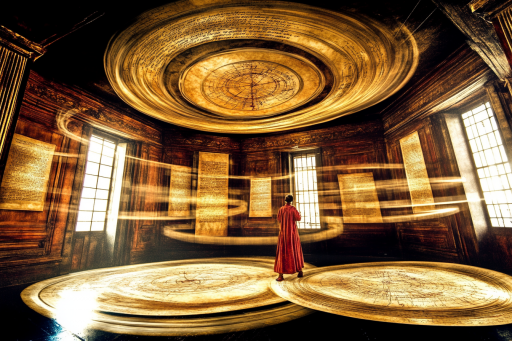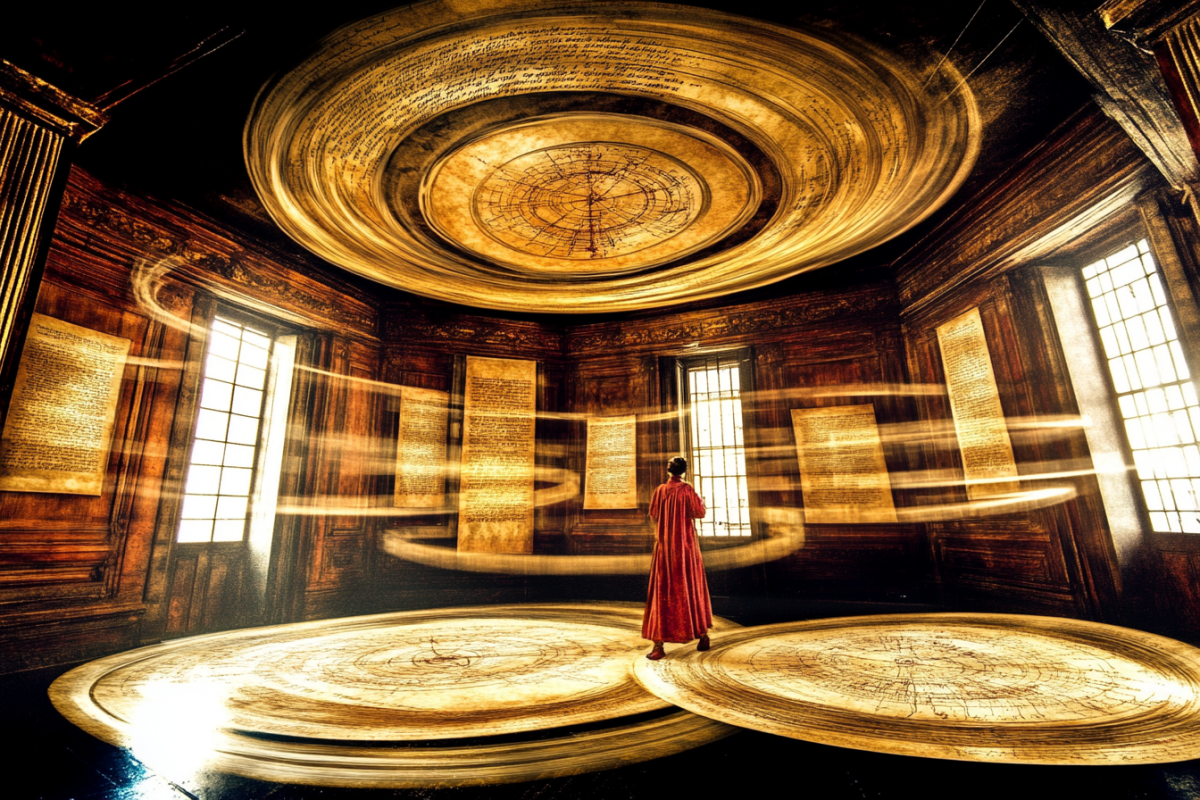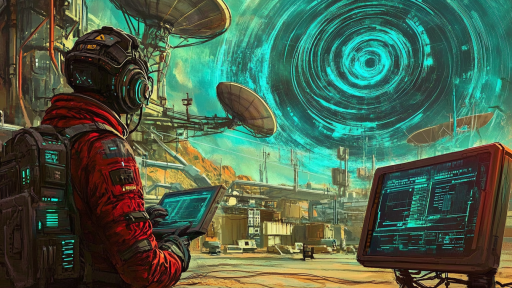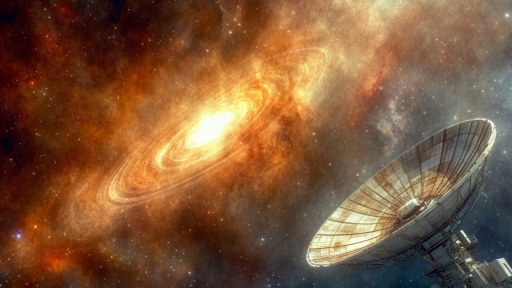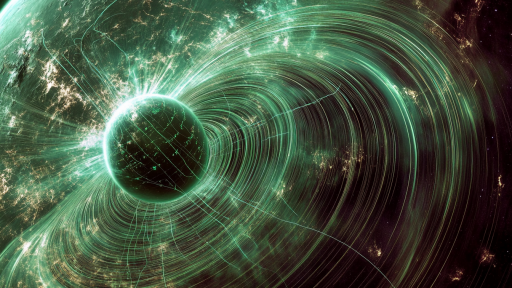
Ancient civilizations gazed at the stars and recorded their observations long before modern science could explain them. Within their sacred texts, mythologies, and coded manuscripts, we find surprisingly accurate descriptions of celestial bodies, cosmic cycles, and mysterious forces governing the universe. Some of these writings contain knowledge that aligns with modern discoveries, while others suggest concepts still beyond our understanding. Could these ancient records be evidence of a deeper connection between past wisdom and the secrets of the cosmos?
The Vedas and the Expanding Universe – A Cosmic Truth Before Its Time

The Rigveda, an ancient Hindu scripture written over 3,000 years ago, describes the universe as constantly expanding and contracting, a concept that mirrors modern Big Bang cosmology. It speaks of the universe being born from a cosmic singularity and later dissolving into nothingness, a cycle strikingly similar to theories of the cyclic universe. Could this ancient text hold clues about the fate of the cosmos?
The Mayan Codices and Galactic Alignments

The Mayan civilization possessed an astonishing understanding of celestial movements, as recorded in the Dresden Codex. Their calculations of planetary orbits and solar eclipses were more precise than those of many later civilizations. Some believe their texts suggest knowledge of cosmic cycles beyond modern astronomy’s grasp, possibly hinting at undiscovered universal patterns. Were the Mayans simply brilliant astronomers, or did they have access to knowledge lost to time?
The Egyptian Pyramid Texts and the Cosmic Afterlife

Carved into the walls of ancient pyramids, the Pyramid Texts describe a celestial journey of the soul, navigating through cosmic gates guarded by powerful forces. Some scholars believe these writings may encode ancient knowledge of star movements and the structure of the cosmos. The texts mention “stairways to the heavens” and “paths among the stars”, eerily resembling modern interpretations of wormholes and space travel. Could the Egyptians have understood cosmic travel in ways we do not yet comprehend?
The Sumerian Enuma Elish – A Story of Planetary Formation?

The ancient Sumerians, one of the earliest known civilizations, recorded the Enuma Elish, a creation story that speaks of celestial bodies forming through violent cosmic collisions. Some researchers have noted parallels between this story and modern theories of planetary formation, particularly the impact hypothesis of Earth’s moon’s origin. Could the Sumerians have preserved a lost understanding of the cosmos?
The Dogon Tribe and Their Knowledge of Sirius B

The Dogon people of Mali claim to have ancient knowledge of the Sirius star system, including the existence of Sirius B, a white dwarf invisible to the naked eye. Their myths describe Sirius B orbiting Sirius A every 50 years, a fact confirmed by modern astronomy. Since this star was only discovered by Western scientists in the 19th century, how did the Dogon know of it centuries earlier?
The Taoist Cosmic Web and Dark Matter

Ancient Taoist texts describe the universe as an interconnected web of forces, resembling the cosmic web of galaxies revealed by modern astrophysics. This concept mirrors today’s understanding of how dark matter forms invisible structures that shape the universe. Could these ancient philosophies have intuited the existence of unseen cosmic forces long before modern science?
The Zoroastrian Bundahishn and the Multiverse Theory

The Bundahishn, an ancient Zoroastrian text, describes the universe as one among many realms, existing alongside parallel worlds with different laws of existence. This idea aligns with modern multiverse theories, which suggest that our universe may be just one of many. Could this ancient Persian text hint at knowledge of dimensions beyond our own?
The Hindu Puranas and the Cyclical Nature of Time

Hindu scriptures such as the Bhagavata Purana describe cosmic cycles lasting billions of years, eerily similar to the timescales used in modern cosmology. These texts speak of eternal cycles of creation and destruction, resembling modern theories of cosmic expansion and contraction. Did ancient sages have insights into time that modern science is only now beginning to explore?
The Hopi Prophecy and the Shifting Stars

The Hopi people of North America recorded prophecies about the changing skies, describing stars shifting in ways that science has only recently confirmed. Their stories mention a time when celestial bodies will move differently, a phenomenon that could be linked to precession, pole shifts, or dark energy-driven expansion. Did the Hopi have an ancient understanding of cosmic motion beyond their time?
The Bible’s “Firmament” and the Cosmic Fabric of Space-Time

The Book of Genesis describes a “firmament” separating the heavens and the Earth, a concept some scholars liken to the fabric of space-time described in Einstein’s theories. The idea of a structured, invisible force shaping the cosmos aligns with modern physics’ understanding of gravity, dark matter, and quantum fields. Could this biblical description reflect an early understanding of cosmic forces?
The Epic of Gilgamesh and the Search for Immortality in the Cosmos

In the Epic of Gilgamesh, the hero journeys across the world in search of eternal life, encountering celestial symbols and descriptions of otherworldly realms. Some believe this could represent an ancient understanding of cosmic cycles and the search for immortality beyond Earth. Could this ancient tale metaphorically hint at the universe’s role in life’s ultimate fate?
The Kabbalistic Tree of Life and the Cosmic Structure

Jewish Kabbalistic texts describe the Tree of Life, a multi-dimensional structure of reality, which some compare to theoretical models of higher-dimensional space. The concept of hidden connections between realms is similar to modern ideas about extra dimensions in string theory. Could these mystical teachings encode knowledge of the universe’s hidden structure?
The Ancient Greek Atomists and the Infinite Universe

Over 2,000 years ago, Greek philosophers like Democritus proposed that matter is composed of indivisible particles (atoms) and that the universe is infinite. This idea was largely ignored until modern physics confirmed that atoms exist and the universe has no discernible edge. Did the Greeks unknowingly describe one of the universe’s most fundamental truths?
The Book of Enoch and the Cosmic Watchers

The Book of Enoch, an ancient Jewish text, speaks of celestial beings called the Watchers, who descended from the heavens to observe and interact with humanity. Some interpretations suggest that these descriptions align with modern theories of extraterrestrial visitors or advanced cosmic entities. The text also describes visions of the universe, including vast dimensions, multiple heavens, and cosmic laws, that strangely resemble modern astrophysical concepts. Could this ancient text be describing interstellar travelers or higher-dimensional beings?
The Tibetan Book of the Dead and the Journey Through the Universe

The Tibetan Book of the Dead describes the soul’s journey through different realms after death, many of which resemble cosmic dimensions or interstellar landscapes. The text speaks of radiant lights, portals between realities, and powerful energy fields that determine the next stage of existence. Some believe these descriptions parallel modern ideas about higher dimensions, consciousness beyond physical form, and even quantum physics. Could this ancient book contain insights into the nature of the universe beyond life itself?
Are We Just Rediscovering What Was Always Known?

Ancient texts have preserved ideas about the universe, time, and existence that closely resemble modern discoveries. Some of these insights may have been intuitive, symbolic, or passed down through lost knowledge, hinting at a connection between the past and the cutting edge of science. Could our ancestors have glimpsed cosmic truths in ways we have yet to fully understand? What other secrets might still be hidden in ancient words, waiting to be rediscovered?

